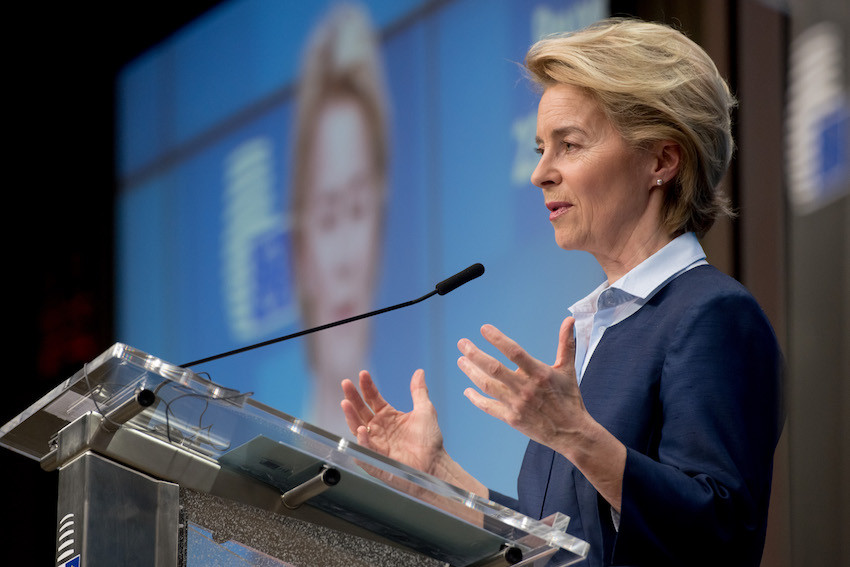EU leaders agree to rescue plan outline
European heads of state and government agreed to a framework for a €1trn stimulus package to revive the EU’s virus-hit economy. Details on how to pay for the programme were punted to the next videoconference on 6 May. EU leaders also endorsed a previous plan to provide €540bn in loans and guarantees through existing EU outfits, such as the European Stability Mechanism. In addition, the European Commission was tasked with revising the EU’s regular 7-year budget to support recovery. Angela Merkel, the German chancellor, said Berlin would be willing to contribute more to European coffers. Sources: BBC, Euractiv, Financial Times, The Guardian, NPR, Politico and RTE.
US expands support spending
The US congress approved a further $484bn stimulus package, mainly to support small businesses and hospitals, bringing America’s total virus recovery spending to $3trn. Donald Trump said he would sign the legislation shortly. Sources: CNBC, Deutsche Welle, Financial Times, NPR, Marketwatch and Reuters.
US unemployment continues to rise
An additional 4.4m Americans filed jobless claims last week, bringing the total since mid-March to 26.4m, or about 11% of the workforce. Sources: Associated Press, BBC, CNBC, Financial Times and NPR.
Gilead disputes remdesivir study
Shares in the biotech firm Gilead slumped after the World Health Organization accidently published (and subsequently unpublished) a draft report on its website stating that Gilead’s remdesivir was ineffective in treating covid-19 patients. Gilead said “the post included inappropriate characterizations of the study,” whose “results are inconclusive.” Sources: CNBC, CNN, Financial Times, Marketwatch and Reuters.
Merkel lockdown exit warning
The German chancellor, Angela Merkel, told Germany’s parliament that covid-19 restrictions must be lifted slowly and the road to recovery was long. “We are not in the final phase of the pandemic, but still at the beginning,” she said. “We’ll have to live with this virus for a long time.” Sources: BBC, Channel 4 News, CNN, Financial Times and The Guardian.
Lufthansa says it needs bailout
The German airline Lufthansa warned that it will run out of cash within weeks and hopes to receive a €10bn state rescue package in order to stay afloat. Sources: Deutsche Welle, Financial Times and Reuters.
EU’s top court to Ryanair: show full ticket price
The European Court of Justice ruled that Ryanair needed to display its full fares on its website, saying unavoidable charges and fees needed to be shown in its initial price listings. Sources: Deutsche Welle, Euronews, Irish Times and Reuters.
Google making cutbacks
Google will reportedly cut its marketing budget for the second half of 2020 by 50% and introduced a hiring freeze as the economic slowdown hits its revenues. The company stated: “We are re-evaluating the pace of our investment plans”. First reported by: CNBC. Additional coverage: 9to5Google and CNet.
Zoom adds customers, to join stock index
The number of users of the videoconference service Zoom rose from 200m on 1 April to 300m this week, per CNBC and Seeking Alpha. The company said it has fixed recently flagged security issues, per CNN and The Guardian. However, many large organisations have banned using Zoom, per Bloomberg and Reuters. Nevertheless, the Zoom will join the Nasdaq 100 list of companies on 30 April, per Reuters and Seeking Alpha.
Intel posts good earnings, but stock drops
Shares in one of the world’s largest computer chip makers, Intel, sank by 5% after it declined to provide financial guidance for the second half of the year. Intel’s first quarter revenue and profits were both up. Sources: Bloomberg, CNBC, Marketwatch, The Register and Seeking Alpha.
Personal grooming takes virus hit
Unilever said that, in the covid-19 clampdown era, personal hygiene standards are slipping. Sources: Financial Times and Reuters.
Agenda
Friday 24 April, 11:30am-1pm: Luxembourg House of Startup’s “Seeing opportunities and being innovative in times of change” webinar. Friday 24-Saturday 25 April: Docler Holding and partners organise “Hack the Crisis Luxembourg”, a virtual hackathon. Saturday 25 April, 7pm-11pm: “Home cooking competition Luxembourg” for amateur chefs. Sunday 26 April, 6:30pm-7:30pm: “How sustainable is your closet?” webinar, part of Fashion Revolution Week. Tuesday 28 April, 10am-10:45am: Luxinnovation’s “Locking down the right content” creative industry webinar. Tuesday 28 April, 1:30pm-2:30pm: Paperjam Club’s “Marketing and communication in times of covid-19” webinar. Wednesday 29 April, 11:00am-12noon: British Chamber of Commerce’s “Your brain under quarantine: humans need connection not monitoring” webinar on teleworking.
Here are 9 science & technology stories you may have missed
AI: Machines are now routinely being trained to crunch numbers in complex cancer research projects, per Nature. AI: Microsoft said it created, and will release an open source version of, a system which can accurately tell 99% of the time if software bugs have created a security problem or not, per Venture Beat. Geography: Seismic data revealed a previously unknown tsunami risk to the area proposed as Indonesia’s new administrative capital, per the BBC. Space: Astronomers may or may not have captured images of an exoplanet, thought to be several times larger than Earth, in Proxima Centauri, the closest solar system to our own, per Scientific American. Nutrition: You really should not eat just one type of food, but if you had to select only one then choose potatoes, per Popular Science. Renewables: Researchers have developed a technique that could make solar panels 50% more efficient, per Popular Mechanics. Renewables: Progress on energy storage systems had already stalled in Europe before covid-19, but an industry group warned the outbreak could slow the switch to clean energy, per The Guardian. Public health: The Register looked at the different approaches around the world to contact-tracing apps, used to combat contagions. Public health: Researchers have been able to track covid-19 in the Paris region’s sewerage system, which potentially could be used to warn of future outbreaks, per Science magagine.
Lordy linguistics lesson
There are 3,000 words in the English language to describe being drunk, per the BBC (published in January 2017).
Today’s breakfast briefing was written by Aaron Grunwald
